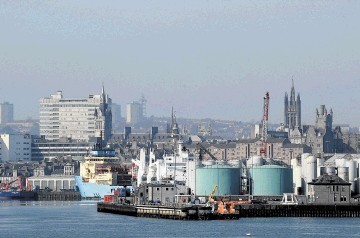
The Aberdeen Harbour Board’s newly-appointed chairman has said he expects his new role to be “challenging and exciting” and pledged his support for the port’s expansion plans.
Incoming chairman Alastair Mackenzie, a former regional director at risk management group Achilles, takes over from Chris Lloyd, who was chairman for the previous four years and a member of the board for six years in total.
The harbour board is pushing for a £320million expansion into nearby Nigg Bay, and its chief executive, Colin Parker, yesterday told Energy Voice’s sister publication, Press & Journal, that his organisation plans to submit a bid for EU funding to support the construction phase.
Mr Mackenzie also said he is keen to deliver the new facility despite the recent slump in oil prices, which had cast some doubt on the feasibility of the proposals.
A board member since 2010, Mr Mackenzie said: “Taking up the role as chair at such a significant time for Aberdeen Harbour will be both challenging and exciting.
“I would like to thank Chris for his leadership and vision, and I am committed to leading the board as plans develop to expand Aberdeen Harbour into Nigg Bay.”
The reshuffle also sees Bibby Offshore chief executive Howard Woodcock step into the role of vice chairman, while Mike Porter, formerly a chief operating officer at energy industry logistics firm Peterson, has joined the board as a non-executive member.
Mr Parker thanked the outgoing chairman for his work over the last four years and said the new appointments will help it continue to operate at the highest possible standard.
He also reiterated the board’s intention to “take the long term view” and plow ahead with the Nigg Bay development, which last year received the backing of Holyrood and an independent report commissioned by Scottish Enterprise.
Mr Parker said that although the drop in oil prices is worrying, the prospect of subsea-related decommissioning work brought on by such downturns means there is a need for greater berthing space.
He said the board’s biggest concern is that decommissioning, which will require a significant amount of expenditure over the coming decades, will “drift away” to the likes of Norway if the capacity is not available in the north east of Scotland.
“Nigg Bay is a 10-year project so it’s inevitable you are going to face peaks and troughs in the oil price in that period, so if you’re looking to address future demand for the industry and the region then you have to take the long term view,” Mr Parker said.
He added that the project, which last year received nearly £600,000 from the European Commission for feasibility studies, will also look to benefit deep-sea fishing, renewables and cruise ships.
The project’s environmental impact assessment will be completed this summer, while a scale model that will be used for wave analysis is about to be commissioned.
Recommended for you
